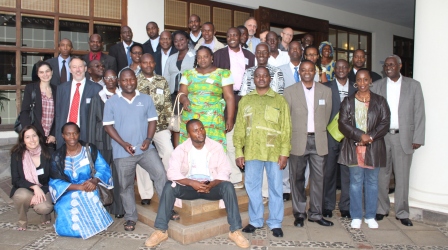A new initiative for peace in the Great Lakes

Eight of the 15 lakes in the Rift Valley of East and Central Africa are considered to be ranked as ‘Great Lakes’ giving this diverse and beautiful region its name. But the area has been plagued by conflict for decades.
“In Congo alone, it is estimated that 5.4 million people have died due to the direct and indirect consequences of war. In Rwanda, the Genocide of the Tutsis and moderate Hutus in 1994 claimed the lives of one million people. And, 300,000 Burundians are estimated to have lost their lives during violence in their country between 1993 and 2008,” confirmed Maud Roure, Interpeace Programme Officer for the Great Lakes Region.
What are the drivers of violence and how can they be overcome?
Interpeace has just completed preliminary research to find out just what residents of the region are thinking now about what divides their communities and what connects them.
Maud explains: “From the hills to the lakes to the cities, strong themes have come through in the research. Security and governance were seen to be major issues. Access to natural resources and their management was another strong theme. But overall, the issue that has received little attention to date and came through strongly, was how ideas and actions are based on stereotyping and the manipulation of collective identities.”
In a recent workshop representatives from three countries (Burundi, Rwanda and the Democratic Republic of the Congo) met in Nairobi, Kenya along with a representative from the Economic Commission of the Great Lakes. They openly discuss the problems and issues facing the region and laid the foundations for this new Interpeace initiative.
This meeting came after years of hard work by local researchers who had been tasked with learning about the dividing and connecting factors of the people in the region. In June this year, they each presented back their results. The communities involved in the research were then given their chance to comment and provide additional input.
“The Nairobi workshop brought the priorities of the people to the forefront. The research showed that across the region, people feel a strong disconnect with the peace initiatives being taken at the government and regional level. They do not feel as though their needs are being prioritized” explained Johan Svensson, Interpeace Director of Eastern and Central Africa, who participated in the workshop.
Regarding next steps, Johan confirmed: “On the basis of the research findings and the recent workshops and meetings, Interpeace is now developing an action plan for a new programme in the area. It will focus on articulating and connecting their views with decision makers so their voices are heard while also enabling them to overcome stereotyping through trans-regional dialogue.”
